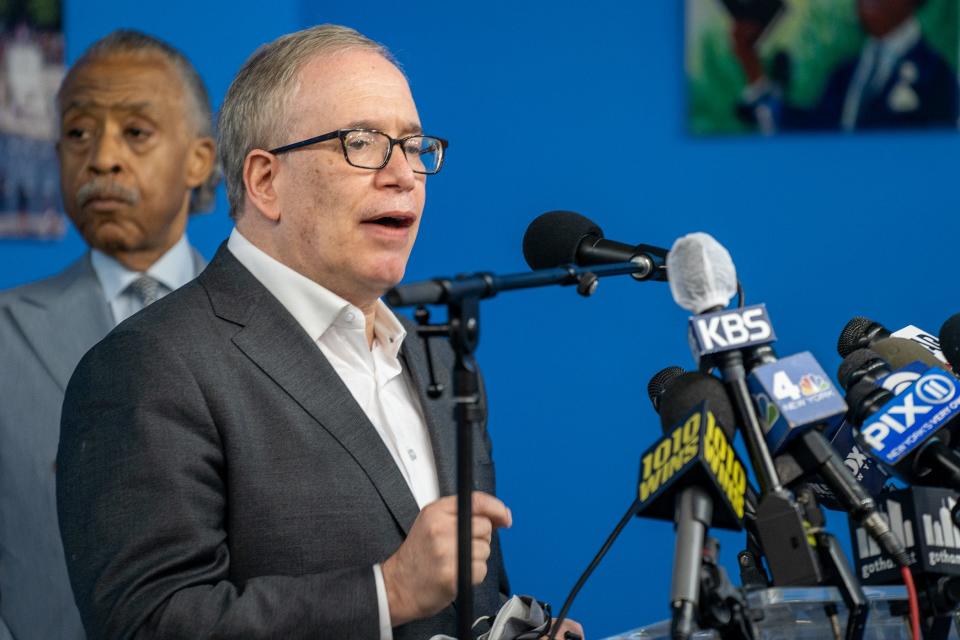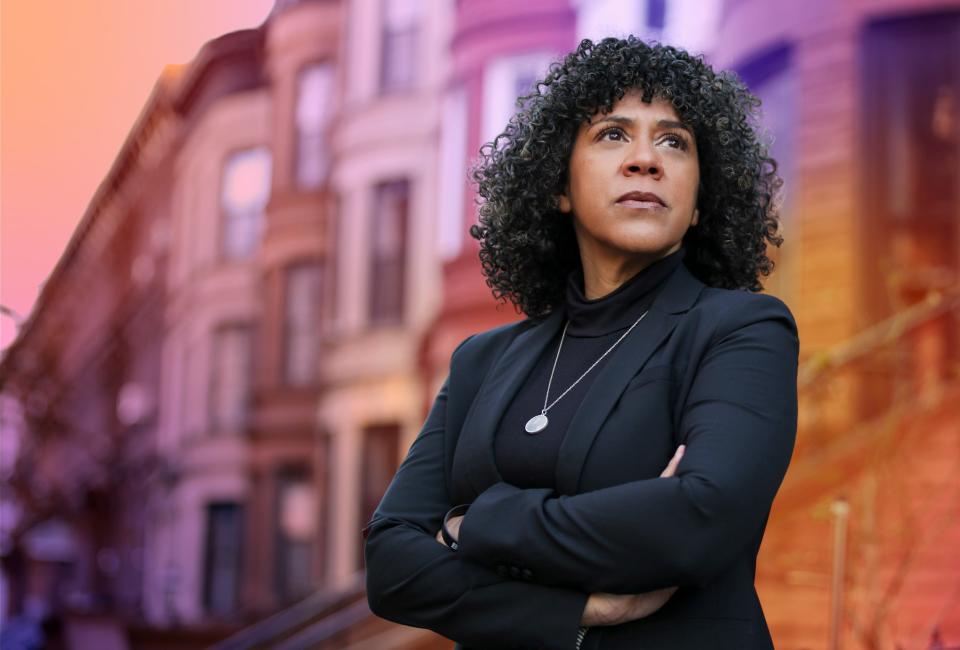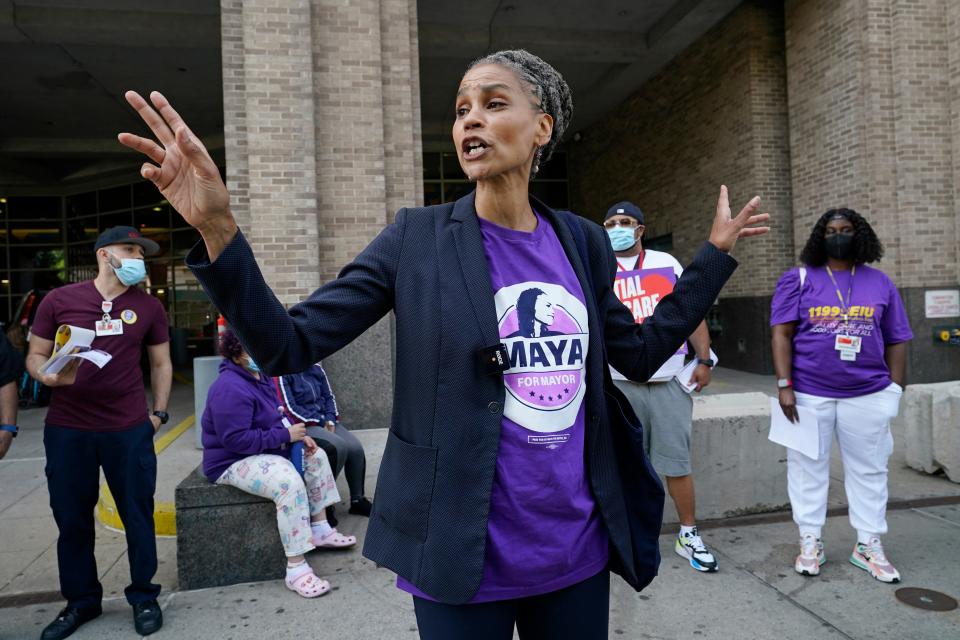New York City mayoral race: What to know about the candidates, issues and why a 'progressive' isn't leading the way
NEW YORK – In what could be the most consequential mayoral elections in the city's recent history, a host of Democratic candidates in a tightly contested race are vying to become the Big Apple's next mayor.
Eight major Democrats are making their final bids to New York City voters in a campaign that has touched on a variety of challenges facing the city, led to a diverse list of candidates and featured plenty of Zoom calls.
The winner of the Democratic primary June 22 is likely to win the general election in November since no Republican candidate has presented a serious challenge. New to this year's election is ranked choice voting, which could lead to some unexpected quirks in how votes fall as candidates are eliminated.
The leading contenders are Andrew Yang, who is still seizing on the energy around his 2020 Democratic presidential run; Eric Adams, a former NYPD officer zeroed in on public safety; and Kathryn Garcia, who touts her long governmental experience to lead New York back to a pre-pandemic normal.
Democratic Mayor Bill de Blasio, who has reached his term limit, has not endorsed any candidate.
Among the issues making this year's election so closely watched: spikes in crime and concerns about public safety, New York's economic recovery from the COVID-19 pandemic and equity in policing, housing and education.
"There's a way in which we feel that New York is America on steroids. And whatever happens in this city is a window into what can happen in other cities," said Michael Hendrix, director of state and local policy at the Manhattan Institute.
Here's what you need to know:
Who is running for New York City mayor?
The eight major Democratic candidates are:
Eric Adams: The Brooklyn Borough president, a former New York state senator and former NYPD captain.
Shaun Donovan: A former secretary of Housing and Urban Development and director of the Office of Management and Budget in President Barack Obama's administration as well as the head of the city's Housing Preservation and Development department under Mayor Mike Bloomberg.
Kathryn Garcia: A former head of the city's Department of Sanitation and interim chair of the New York City Housing Authority under Mayor de Blasio and the former COO of the city's Department of Environmental Protection under Bloomberg.
Ray McGuire: A former Wall Street executive, most recently vice chairman of Citigroup.
Dianne Morales: A former executive of a nonprofit group and former employee in the city's Department of Education, helping launch the Office of Youth Development and School-Community Services under Bloomberg.
Scott Stringer: The city's comptroller, a former Manhattan Borough president and former state Assembly member for the Upper West Side.
Maya Wiley: An MSNBC commentator, professor at the New School, former chair of the city's civilian police oversight agency and former counsel to de Blasio.
Andrew Yang: A former 2020 Democratic presidential candidate, entrepreneur and nonprofit group founder.
Who are the front-runners?
In polls, Yang and Adams have remained the front-runners, though Garcia has picked up steam.
Yang has carried the momentum around his basic income plan during his presidential run into the race for mayor, calling for a local version of the idea for New York's poorest residents.
Throughout the race, he has combated attacks that he's an outsider who doesn't know enough about the city to be its mayor. Yang grew up in Westchester County and lives with his family in Manhattan. He's received criticism for leaving the city during the pandemic and not voting in mayoral elections.
More on Eric Adams: New York City mayoral candidate takes heat from report he may live in New Jersey
Hendrix said Yang has used the outsider attacks to his advantage as he tries to run a campaign as a "thoughtful counter to the elite narrative" within the city's politics.
Adams has campaigned on public safety messages while focusing on the inequality in the city. Bruce Berg, a political science professor at Fordham University who specializes in New York City politics, said Adams established credibility among voters as a "homegrown" candidate and because of his police background.
"He is someone who used to be a policeman, and he understands some of the Black community's suspicion of police," so he doesn't want police to leave but rather "engage in true community policing," Hendrix said. The New York Post endorsed Adams.
Garcia bills herself as a pragmatist who knows how to efficiently run New York's institutions. Under Bloomberg, she was tasked as a crisis manager addressing issues around the city's wastewater treatment plants during Superstorm Sandy, and de Blasio picked her as his COVID-19 "food czar."
"She's both an insider that can run as an outsider, meaning she's not been an elected official working the political circuit ... but is enough of an insider that she knows how the game is played," Hendrix said.
Her campaign won a boost with endorsements from the Editorial Boards of The New York Times and New York Daily News, and Hendrix said she could garner broader, cross-borough support from highly educated voters.
Republican candidates include businessman Fernando Mateo and Guardian Angels founder and radio host Curtis Sliwa. At least five other Democrats will be on the ballot but have not appeared at recent debates.
Who are the other candidates, and why isn't a 'progressive' leading the way?
Donovan and McGuire have generally polled the lowest.
Donovan has leaned into his city and federal government experience, seeking to address affordable housing issues and create "15-minute neighborhoods," which call for all New Yorkers to have good schools, public transportation, a park and fresh food within 15 minutes of their homes.
More on progressives: Progressives unite around one candidate in NYC mayor's race. Will it be enough to win the 'post-COVID moment'?
McGuire touts his extensive private sector experience in arguing the case for how he'd lead the city out of its economic crisis. As one of the longest-serving Black executives on Wall Street, he vowed to bridge gaps in racial and economic inequality.
While other candidates have been cast as more moderate Democrats, Stringer, Wiley and Morales have all sought to win the liberal vote. None has cracked the top-tier in recent polling dispute the perception of New York City as a "progressive" haven.
Early on in the race, Stringer was a front-runner, Berg said. Having served as comptroller and a variety of other political posts in the city, he "was supposed to be the experienced candidate who ran away with the progressive lane," Hendrix said.

Stringer backs policies such as shifting responsibilities away from police and greatly expanding affordable housing, but his campaign was crippled by an allegation of sexual harassment. Stringer denied the allegation, but he lost the backing of several prominent left-leaning politicians in the city, as well as the endorsement of the Working Families Party.
The party split its endorsement between Wiley and Morales. Morales has been the candidate furthest to the left (the "hardcore progressive candidate," Hendrix said), and she is the only candidate to openly back the "defund the police" movement. Her campaign appeared to be in limbo after organizers held a work stoppage. She has not polled beyond the bottom tier of the major candidates.
What does 'defund the police' mean? And why some say 'reform' is not enough

Wiley has campaigned on "transforming" the New York Police Department and propping up the "care economy" by increasing funding for child and elderly care and developing "community care centers" for job training, mental health services and community activities.
"She can compete to number four, number three, maybe number five, somewhere in the rankings, but she hasn't established a dominant presence," Hendrix said.
Hendrix and Berg said that although the city is perceived in national media as extremely progressive, electing candidates such as Rep. Alexandria Ocasio-Cortez, its electorate on the whole is much more moderate.
Berg noted that before de Blasio, the city hadn't elected a Democrat as mayor for five terms. "Two terms of (Mayor Rudy) Giuliani and three terms of Bloomberg, that doesn't define a radical leftist city in any way, shape or form," he said.

None of the Republicans running appears to pose a formidable threat to the Democrats in November. Berg said the Republican candidates are not from the establishment of the party.
Hendrix said voters in local elections are often much more focused on the basics: Are the streets safe? Is the economy growing? Can they afford food and a roof over their heads?
"A desire to have leaders who do the basics well is obscured by the increasing nationalization of politics," Hendrix said.
What are the major issues in the race?
Crime and public safety are among the biggest issues candidates campaigned on. Amid high-profile shootings and hate crimes, most of the candidates have not embraced the "defund the police" movement, and Adams and Yang sought to cultivate tougher-on-crime stances, Hendrix said.
Adams' and Yang's platforms include plans to reassign officers to areas with high levels of crime; Garcia calls for adding officers to the neighborhood policing unit.
All three front-runners called for various reforms to the NYPD. Garcia pushes for the minimum age of officers to be 25; Yang calls for more than half of the department's leaders to be people of color; and Adams said he would pick the city's first female police commissioner.

The COVID-19 pandemic has shaped the mayor's race since the first day of campaigning. Candidates and special interest groups initially held their events and forums online via videoconferences. The first debate in May was held virtually, although one Wednesday night was held in person.
Hendrix said voters' concerns have shifted from candidates' plans to address the COVID-19 pandemic to their plans to recover from it.
"The big issue is in what condition will the city be in in January 2022, when this person takes over. Will they inherit a New York City that's back to normal? Or will they inherit a New York City that still has lots of problems getting back to normal?" Berg said.
Many of the questions candidates are asked have implications nationwide and focus on equity, Berg said, from how to provide more housing at affordable prices to how to better integrate schools.
"Even if all the other issues are resolved … by the time the new mayor takes over, the racial disparity issue is going to remain for quite some time. And it's something that a new mayor is going to have to get a handle on," Berg said.
NYC recovery: Tourists come back as pandemic restrictions ease and 'feel the city reawakening'
How could ranked choice voting affect the election?
New to this year's race for mayor is ranked choice voting, a system that will allow voters to select up to top five candidates. The change is a result of a 2019 ballot initiative to enact ranked choice for primaries and special elections.
If no candidate wins 50% of the vote outright, the candidate with the fewest first choice votes would be eliminated, and the preferences of the ballots listing them as first would be redistributed. The process would continue until two candidates were left, and the person with the most votes would win.
Ranked choice has been used in Oakland, California, and Cambridge, Massachusetts, and the majority of the time, it doesn't yield surprising results, Hendrix said.
But in a race as close as the one for New York's mayor, it could lead to the person who is in second after Round 1 winning as other candidates are eliminated.
In a poll in May from the Manhattan Institute and Public Opinion Strategies, Yang led Adams by just 1% after Round 1. After all other candidates fell off, Adams was victorious, winning 52% vs. 48%.
The polling showed Garcia in third place after the first round, but Wiley ended up making it to the stage with the final three candidates based on how voters' redistributed preferences landed.
Another wrinkle in the ranked choice system, Berg noted, is how long it will take to count the votes. In special elections for City Council, counting all the votes in the ranked choice system led to winners not being declared for several weeks after election day – and there were far fewer votes than what will be cast in the mayoral election, Berg said.
Follow USA TODAY's Ryan Miller on Twitter @RyanW_Miller
This article originally appeared on USA TODAY: NYC mayoral race: Who are the candidates? Who is leading? What to know

 money
money 